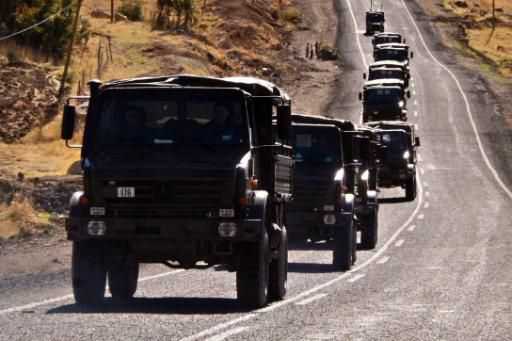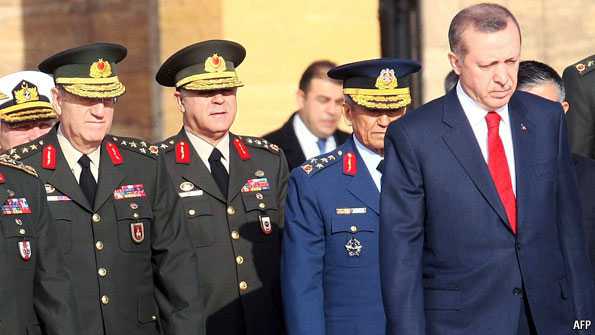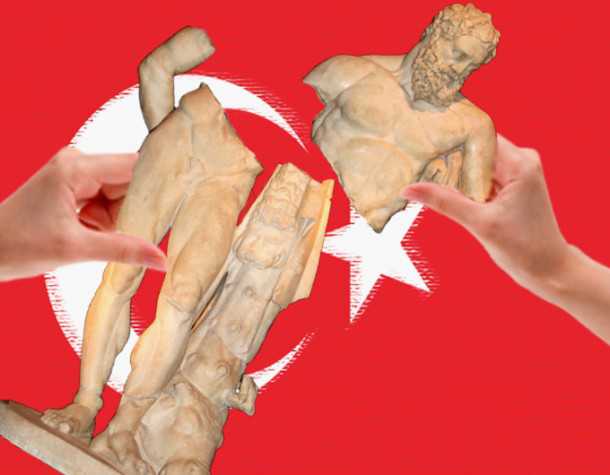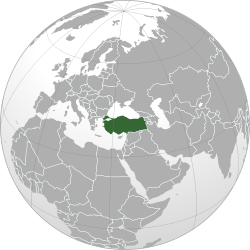On February 16, Turkey’s largest media company, the Dogan Media Group, was
fined nearly $500 million for an alleged late tax payment. Tax laws are complicated,
and the exact circumstances of the matter are unclear. The troubling point is that this
follows on five months of public bullying of the Dogan group by Turkish Prime
Minister Recep Tayyip Erdogan. Since September, he has repeatedly asked his
followers to boycott DMG’s newspapers. The tax investigation into the Dogan
group, moreover, began only a few weeks after the opening of a court case to close the
governing AKP. Erdogan argues that the tax case is a matter not of press freedom
but of tax evasion, yet the fine can hardly be defended as “business as usual.”
Turkey Analyst, 27 February 2008 7
Date: Mon, 2 Mar 2009 23:18:34 -0800
From: [email protected]
BACKGROUND: What tipped Turkish Prime Minister Erdogan against Aydin Dogan, the owner of the Dogan Media Group (DMG), was its coverage of a scandalous corruption case. In early September 2008, a state court in Frankfurt, Germany, began hearing a case alleging that Deniz Feneri, a charity formed and supported by Turks living in Europe to aid the poor, had embezzled 18million Euros out of the 41 million Euros collected – and Dogan media had become the first to break the news in Turkey.(See 26 September 2008 issue of the Turkey Analyst)
On Sept. 7, 2008, Erdogan angrily lashed out at DMG, saying that “nobody can throw the mud of corruption on AKP. The ones who throw that mud, will be drowned in that mud.” He called on his supporters to boycott DMG’s newspapers, and claimed that the DMG’s reports were lies. But on Sept.17, the German court convicted all three defendants – Mehmet Gürhan, Mehmet Taskan and Firdevsi Ermis – finalizing the largest charity fraud case in Germany. Although the indictment did not detail where or how the misused
money had been spent, Ermis said in her testimony their charity’s aim was to support the AKP and that the board members all had close ties to Turkey’s government. The verdict implicated individuals close to Erdogan, such as his appointee to head the Radio and
Television High Commission.
In the meantime, Erdogan argued that DMG pushed such allegations against him and his party because DMG’s owner, Aydin Dogan, had failed to receive an alteration of a license to convert his Istanbul Hilton property into a residential compound, and because the Radio and Television High Board had not approved a land frequency for his CNN Türk television.
Erdogan accused Dogan of seeking favors in his business deals, trying to benefit from his position as a media owner. And Erdogan publicly threatened him: “There must certainly be
something underneath this, something you’re not telling. I know what it is…I will be in Istanbul for conventions on [Sept. 13-14, 2008]. If you tell it, you will. If not, I will say it. Let me warn you.” Neither Erdogan nor Dogan have said a word about it since then. But Dogan’s tax fine followed. DMG’s Executive Committee Vice President, Soner Gedik, said the company will appeal the decision, and said that until it is finalized – which could take up to seven years – the company is not obligated to pay.
But the scandal is only a part of Prime Minister Erdogan’s attacks on the Turkish media. Indeed, he often complains about mistakes made by the press. Erdogan’s office recently cancelled the accreditation of seven Turkish journalists, saying they failed to “implement the rules of media ethics.” One of them, Ali Ekber Erturk of Aksam daily, however, discovered that the Prime Ministry recently approved a “permanent press card” for Mehmet Gürhan, who had received a guilty sentence in Germany on charges related to the Deniz Feneri case, and who was sentenced to almost six years in prison. For everyone else,
however, the law maintains that an individual seeking a permanent press card should have no record of convictions.
Furthermore, Erdogan roared in anger as the daily Aksam ran a front-page article on December 20, 2008, criticizing the government’s support for the coal industry, its impact on the quality of air and human health. The paper took attention that consumption of natural gas fell by 35 percent after an 80 percent price hike. “Either you close your newspaper or you stop publishing lies,” Erdogan demanded. But the news was accurate. (Aksam is owned by Mehmet Emin Karamehmet, another business tycoon).
Erdogan appears to believe that there is an ulterior motive behind almost every bit of news reporting. Recently, he was troubled about coverage of school conditions, especially in Turkey’s eastern and southeastern regions, where the winter weather is harsh. “They find a school in the east or southeast,” Erdogan said last December; “in that school, the stove is not burning. If you are an honest media…in reporting on it, you should have called the related minister: ‘Mr. Minister, there is such a problem, we wanted to inform you.’ If that
trouble isn’t solved, then you can make a news story on it.” Sedat Ergin, Executive Editor of DMG-owned Milliyet daily, pointedly wrote that the Prime Minister aims “to take control of the decision of what constitutes news out of the hands of the newsrooms [and give it] to the ruling party. It would not be unfair to define this as an official censorship policy.”
The DMG controversy also follows the murky conditions under which another large media
holding, the Sabah/ATV group, changed hands last year. (See June 4, 2008, issue of the
Turkey Analyst)
After having been taken over by the state’s Savings Deposit Insurance Fund, it was sold in
a single-bidder auction, and in a deal financed by two state banks and a Qatari fund, to a corporation whose media wing is headed by Erdogan’s son-in-law. In this context, Erdogan’s refusal to tolerate any criticism by anyone he regards as “the opposition”
raises doubts regarding the DMG’s alleged tax fraud. Furthermore, it raises concerns regarding the arrests of numerous journalists and media owners in connection with the Ergenekon case, involving the investigation into an alleged conspiracy to topple the government (See January 16 issue of the Turkey Analyst).
More specifically, it puts into question the fairness of the charges connecting them to the alleged terrorist organization whose aim is to bring down the Turkish government. For example, on January 23, security forces arrested Mustafa Ozbek, chairman of the Turkish Metal Workers’ Union and honorary president of Avrasya TV (ART) on suspicions that he funded the Ergenekon organization. Broadcasting has been halted at the television station for hours at a time, and the Union’s financial records going back five years have reportedly been seized.
IMPLICATIONS: An atmosphere of fear and intimidation has been spreading among Turkish journalists and thinkers. “A journalist who works at a media organization that
goes through a police investigation always feels under pressure,” as said Yilmaz Polat,
ART’s Washington correspondent. He is giving a voice to the fears shared by numerous
journalists who work for DMG or other outlets that do not toe the AKP’s line.
Journalists do not practice their craft to become wealthy; most of them do not make much money. If they feel intimidated, they may choose to stay on the safe side in an intimidating environment – and the precedent would be set. After all, the government is currently going after Turkey’s largest media group and its owner – who pays 11
percent of Istanbul’s tax income.
The growing pressure on Turkish media freedom has not gone unnoticed. In a written statement on February 20, David Dadge, Director of the International Press Institute and the South East Europe Media Organization stated that “the timing and unprecedented size of this tax fine raise serious concerns that the authorities are changing their approach from rhetoric to using the state apparatus to harass the media.” IPI’s National Committee in Turkey also argues that “this shows that the aim is not to punish the tax irregularity, but
to liquidate the largest media group in the country.”
Deniz Baykal,leader of the main opposition Republican People’s Party, said the fine
“represents a crisis of the democratic regime itself.” Erdogan refers to Baykal and DMG as “strongly partisan media, equally partisan political party.”
CONCLUSIONS: Erdogan used to defend his Islamist base, saying that these people did not come from the sky, but were loyal citizens like everyone else. Conversely, then, he must understand that Turkish journalists are not coming from anywhere else, either. Erdogan’s suggestion that newspapers should be closed down is nothing but a chilling idea. Yet he seems to be using his power in that direction. But Turkey can claim to be a democracy only as long as it has a free media, free even to make mistakes. If there is
enough dynamism and abundance, those mistakes will be corrected.
The state’s harassment of journalism is reaching troubling levels, sharply dividing the population and intensifying perceptions of “the other.” Prime Minister Erdogan has sued more people than any other Turkish Prime Minister in history. In fact, aside from suing opponents like opposition leaders Baykal of the CHP and Devlet Bahçeli of the
Nationalist Movement Party (MHP), he has also sued over 70 journalists – and on several occasions, sued the same journalist repeatedly, demanding compensation for alleged offenses. Erdogan’s aggressive rhetoric in fact promises not conciliation and compromise, but polarization and division in society.
Aydin Dogan certainly should not be immune to criticism. In fact, many believe he has abused his power as a media executive – at times weighing in with support for various players in political scene – to benefit his other businesses or to secure government bids for his new business projects. As Fatih Altayli, executive editor of Haberturk, observes, Dogan is hardly a model for business ethics. In short, the issue is not whether Dogan loses his business or is being pushed to downsize. But if he does, how that happens will matter. It will set a precedent for the evolution of Turkish media freedom, and with that its European prospects.
AUTHOR’S BIO: Tulin Daloglu is the Chief Washington Correspondent of Habertürk,
a television news channel and a forthcoming daily paper.(Habertürk is not affiliated with DMG)
|






